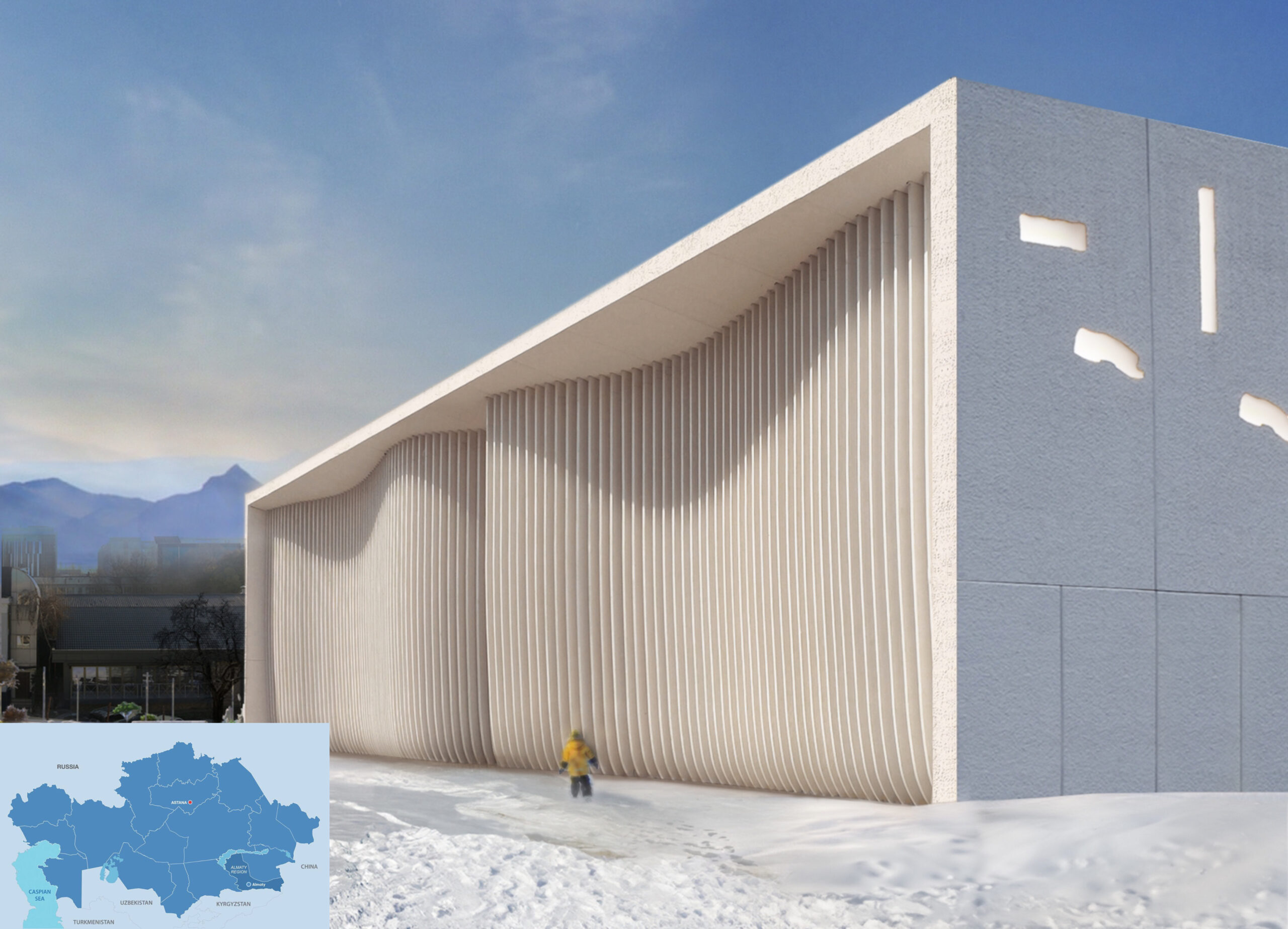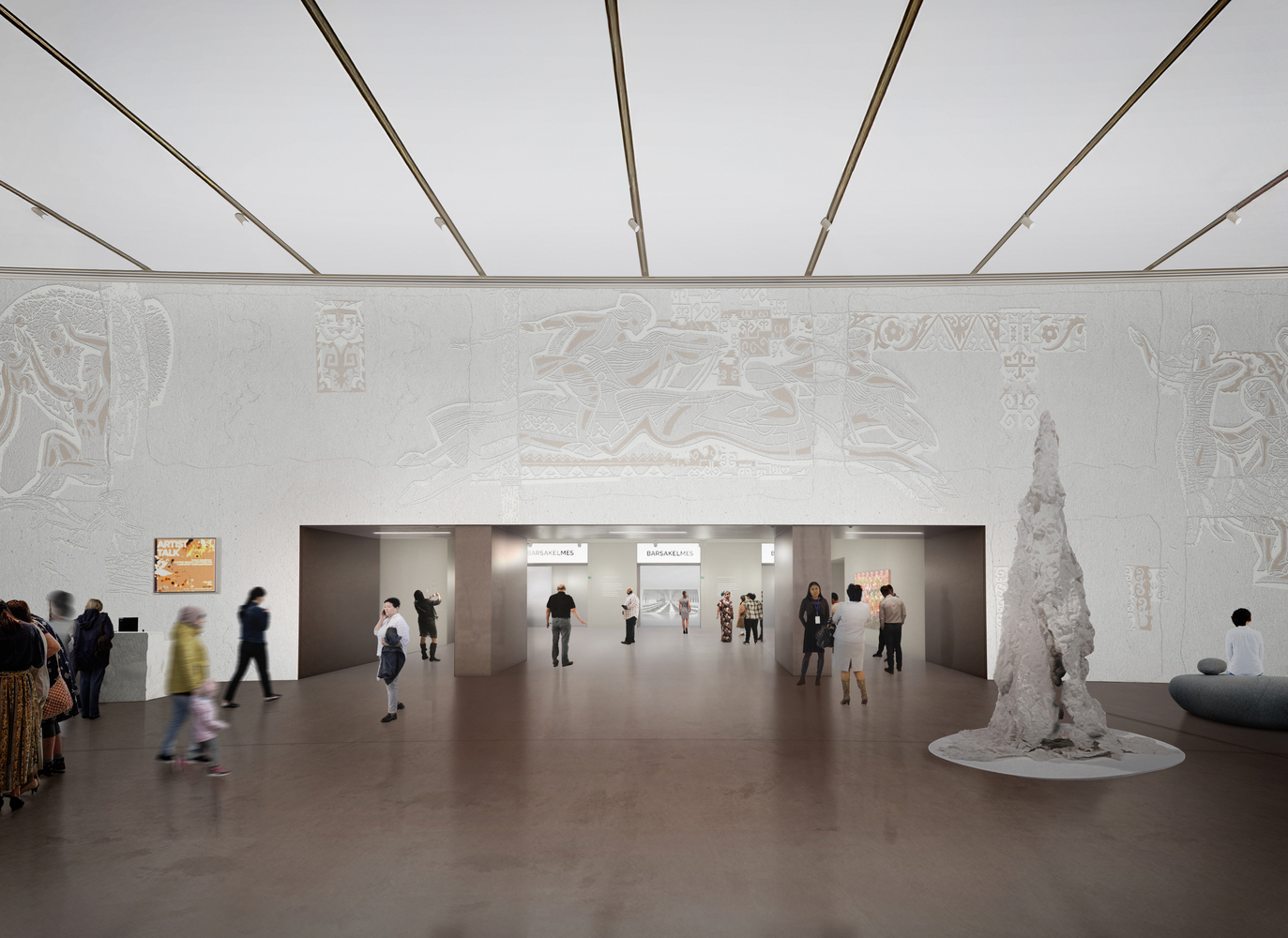ASTANA — In the heart of Almaty, British architect Asif Khan has reimagined a Soviet-era cinema into a multifunctional venue for contemporary art and cultural exchange. Set to open in April, the Tselinny Center of Contemporary Culture will serve as Kazakhstan’s first independent cultural institution, providing a platform for art exhibitions, performances, film screenings, and research initiatives. The project represents a commitment to fostering a dynamic and self-sustaining creative scene in Central Asia.

Tselinny Cultural Center. Photo credit: Asif Khan Studio. Click to see the map in full size. The map is designed by The Astana Times.
It should be noted that Khan’s works are on display at the 2025 Islamic Arts Biennale in Jeddah, Saudi Arabia, taking place between Jan. 25 – May 25. One of the highlights of the exhibition is the Glass Qur’an composed of 604 glass folios, each one is hand-gilded with 24-carat gold by Arabic calligrapher Uthman Taha. The work reflects on the Holy Qur’an as a relationship with light.
Honoring the past while looking to the future
Built in 1964 as one of the Soviet Union’s grand panoramic cinemas, Tselinny has long been a cultural touchstone for Almaty. Various renovations over time changed its structure and purpose, but its historical significance endured. Under Khan’s direction, the transformation began in 2019 and carefully preserves the building’s original elements while adapting them for contemporary use.

British architect Asif Khan. Photo credit: nla.london
Tselinny’s artistic and intellectual strategy is structured around two core concepts: “Here” and “Now.” The former represents the physical space where projects, performances, and experimental formats take shape, while the latter encompasses ongoing research into social, cultural, and humanitarian issues.
For its first five years, the institution has identified three key areas of research projects: Gender, Faith, and Ecology. Through initiatives like the Horizon research platform, a Scholar-in-Residence program, and Tselinny Publishing, the center is designed not just as a venue but as a think tank for critical discourse on the evolving cultural landscape of Central Asia.
Recognizing the limitations of a singular curatorial perspective, the center also formed an international advisory board in 2021, drawing from leading practitioners in contemporary art and visual culture. This collaborative approach ensures that Tselinny’s impact extends beyond Kazakhstan, fostering dialogue between the intellectual and artistic communities across the region and beyond.
Barsakelmes: inaugural program reflecting Kazakh cultural heritage
The significance of this transformation is further underscored by its inaugural program, to take place this April, Barsakelmes. Much like Tselinny’s previous Korkut Sonic Arts Triennial, this event embraces a nomadic, performative approach, drawing deeply from Kazakh cultural traditions.

Photo credit: Asif Khan Studio
The name, Barsakelmes, meaning “you will go and not return” in Kazakh, refers to a vanished island in the Aral Sea—one of the most striking examples of ecological devastation caused by Soviet-era resource extraction. The legend of Nurtole, an ancient kyishy (performer of kui, a traditional musical form), tells of a mythical figure who banished snake-like creatures to the Aral Sea with the sound of his kobyz. Now, with the sea gone, the spirits of these creatures are said to have returned. This narrative is a powerful metaphor for artistic displacement and the region’s shifting creative landscape.
The Barsakelmes program reimagines this myth through a multidisciplinary lens, weaving together art, sound, music, dance, and visual culture to symbolically purify Tselinny’s new space. Local and regional artists—including Gulnur Mukazhanova, Dariya Temirkhan and Qazaq indie singer Samrattama —have collaborated to shape this initiative, ensuring that the opening is as much a spiritual renewal as a celebration.
Alongside these performances, the program will feature “From Sky to Earth: Tselinny by Asif Khan,” an architectural exhibition curated by Dr. Markus Lähteenmäki detailing the venue’s transformation.
Another key exhibition, “Documentation: Imagination of Central Asia on the Map of Contemporary Art,” curated by Asel Rashidova, will showcase Tselinny’s ongoing documentation project — a digital dataset preserving Central Asian art history from 1985 onwards.
